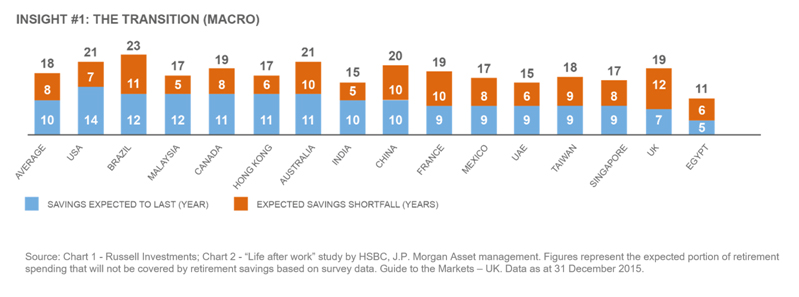Extended lifetime – do your clients have enough for it?
There is an aging crisis on the horizon that goes beyond longevity as we know it: people in developed countries are living longer, but without the funds they need to sustain their high consumption lifestyles. Markets are at the early stage of understanding that extended longevity is a ‘big deal’.
According to a global study by HSBC, the average investor expects their savings to last for only 10 years and to spend another eight years without retirement funds. The below graph shows the extent of the underfunded retirement crisis.
Figure 1: The average investor expects to spend eight years without retirement funds

While financial advisers and their clients know the implications of longevity and take it into account in retirement planning, they usually plan for a horizon of 10–15 years – 20 at most.
“Advisers have been taught that a 30-year planning horizon would be an extremely long one. But what about planning for horizons that are 50 years and longer?” - Tim
The looming crisis raises questions about financial sustainability, with implications beyond investors simply outliving their retirement funds. It requires people to deal with the fact that they do not have enough to sustain their current lifestyles over their extended lifetime.
The worst affected are the Anglo advisory markets of the U.S., the U.K., Canada, Australia and some European countries – all home to baby boomers who are used to high levels of consumption.
Tim calls the extended lifetime the Third Age – a rough English translation of the Spanish term tercera edad o senectud. The term refers to the last decades of life when our activity levels decline, starting from around age 65.
“Now that you’ve got this long life expectancy, which comes with a requirement to consume more, the question is: are your assets and liabilities for that in balance?”.
The reality is that most people have no idea whether they have balanced assets and liabilities. As a result, they do not know how much they need for an extended lifetime and whether they should invest aggressively or conservatively to ensure they have a sufficient nest egg.
Tim encourages financial advisers to understand the implications of extended life, and to help clients ensure the sustainability of their retirement funds and explore new investment strategies. They should start by having more sophisticated conversations with investors to gather a comprehensive profile of each client.
“Advisers can secure clients by having a full picture of their financial and personal situations. Once clients feel that you have this full picture, they will trust you. Don’t give them a reason to go elsewhere and invest time giving someone else that picture of themselves.”
Tim explains that advisers tend to focus more on short-term aspects of financial planning than on sustainability.
“There has to be an aggressive discovery, as we call it at Russell Investments.”
It is important that advisers understand the funded status of investors from a data-driven perspective before giving them advice.
Advisers rely on a popular age-based method of calculating the lifespan of clients and how much they will need in retirement. Using more sophisticated actuarial tools to determine the probability of investors living much longer and running out of savings.
There is much to gain from the problem of extended longevity – when approached the right way. “If correctly embraced, with the use of technology and our imagination, there is enormous human potential to be unlocked.”
Use this calculator with your clients to help them visualise what their retirement lifestyle could look like, and the retirement income they'll need to fund it.